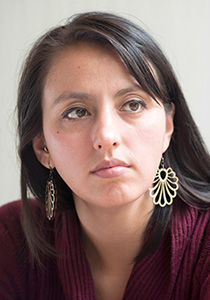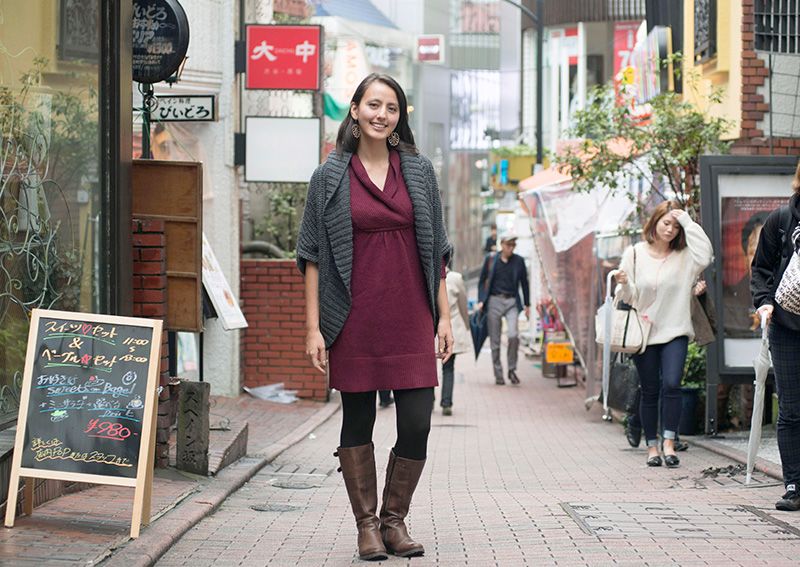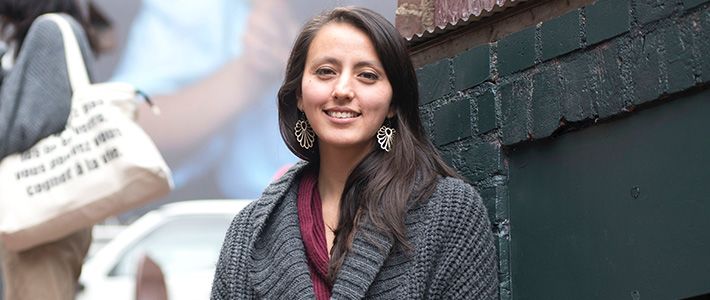
“Hafu” Filmmaker Spotlights Bicultural Japan
Society Culture Lifestyle- English
- 日本語
- 简体字
- 繁體字
- Français
- Español
- العربية
- Русский
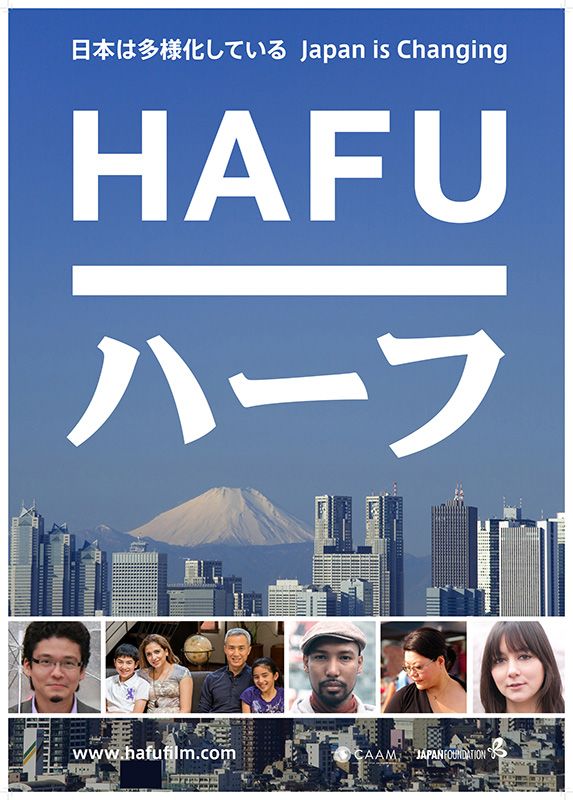 The number of Japanese citizens marrying foreign nationals has been increasing at a rapid pace, and every year more than 20,000 children are born in Japan to such international couples. These binational kids have been in the media spotlight lately, with many celebrities from such backgrounds appearing on television. But the image conveyed on the screen does not fully capture the reality.
The number of Japanese citizens marrying foreign nationals has been increasing at a rapid pace, and every year more than 20,000 children are born in Japan to such international couples. These binational kids have been in the media spotlight lately, with many celebrities from such backgrounds appearing on television. But the image conveyed on the screen does not fully capture the reality.
Unlike many of these TV celebrities, who tend to be children of a Caucasian parent, around three-fourths of all international marriages in Japan involve a partner from another Asian country, most notably China, South Korea, and the Philippines (according to 2007 data from the Ministry of Health, Labor, and Welfare). So many of the children of these marriages do not superficially resemble what most people view as a binational—or hafu, as they are called in Japanese (from the English word “half”—as in “half-Japanese”).
The recently released film Hafu, co-produced by filmmaker Nishikura Megumi, follows the lives of five hafu raised in a bicultural environment. Nippon.com met up with Nishikura to learn more about the film and her own experiences as a bicultural person.
A Search for Identity
Nishikura’s father is Japanese and her mother is an American of Irish descent. Ever since nursery school, she had the feeling that she was a bit different from other Japanese: “I remember the kids in my neighborhood calling me gaijin [foreigner]. I have many happy memories from my days at Japanese elementary school, but I do remember the teacher singling me out for being able to speak English. When I moved to Hawaii and attended high school there, I became completely integrated and did not really think about being hafu or Japanese at all.”
Nishikura says her dream of becoming a film director dates back to middle school. While attending the American School in Japan, she joined the school’s video club and got involved in making documentaries and news programs. Later she majored in film production at New York University and after graduating produced a number of documentaries dealing with peacebuilding and other global issues. Her interest in her own identity as a hafu emerged after she returned to Japan at the age of 26 to pursue a master’s degree in peace studies at International Christian University in Tokyo.
It was Nishikura’s own experiences that led her to explore the question of binational identity: “In Japan, people often ask me ‘What country are you from?’ or ‘Why do you look the way you do with a Japanese name?’ After being asked these questions repeatedly, I started to realize that in Japan, Japanese people don’t see me as Japanese even though I was born and raised here. My secure identity started to waver—‘Am I really Japanese?’ I would ask myself. In order to answer this question, I began going to hafu gatherings. These are often drinking parties for young hafus in their 20s, but many of them were also searching for answers.”
It was through these gatherings that Nishikura became aware of the Hafu Project, which was started in London in 2009. The project was the brainchild of two hafus—a photographer and a researcher—who wanted to shed light on the current situation for hafus through photographs, interviews, and surveys. Nishikura became involved in showcasing the project through her own activities as a filmmaker. She shot two videos chronicling the activities of project members who came to Japan but eventually decided on the idea of creating a full-length film for a general audience in Japan on the hafu theme.
For the film, she teamed up with another director, Takagi Lara, a filmmaker who shared the same interest in bringing this theme to the big screen, based on her own background as a person of Japanese and Spanish descent.
A Diversity of Experiences
The film Hafu, produced in cooperation with participants from the Hafu Project, sheds light on the diverse situations for hafus today, looking at the quite different experiences of five different hafus featured.
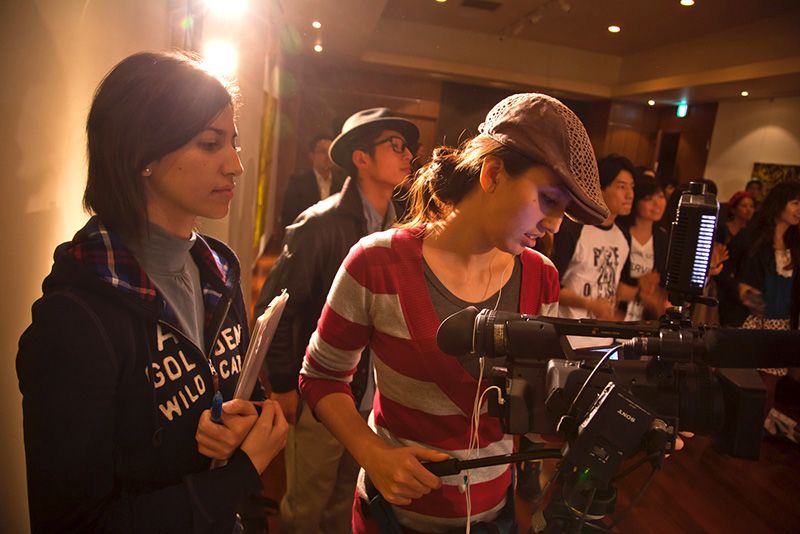 There is Sophia, who was raised in Australia but comes to live in Japan to explore her Japanese roots. Another hafu in the film is David, who was raised in an orphanage along with his older and younger brother and had to overcome the pain of people not viewing him as Japanese. He was reunited eventually with his mother in Ghana. And then there is Fusae, who did not know until she was in high school that her father was Korean. Another hafu featured is Ed, who is considering giving up his Venezuelan citizenship in order to become a Japanese citizen. Finally, the film introduces the audience to Alex, who was bullied in Japan and decided on his own, as a third-grader, to visit his relatives in Mexico. What the five have in common is that they searched for—and found—their own identity and sense of home out of the two cultures of their parents.
There is Sophia, who was raised in Australia but comes to live in Japan to explore her Japanese roots. Another hafu in the film is David, who was raised in an orphanage along with his older and younger brother and had to overcome the pain of people not viewing him as Japanese. He was reunited eventually with his mother in Ghana. And then there is Fusae, who did not know until she was in high school that her father was Korean. Another hafu featured is Ed, who is considering giving up his Venezuelan citizenship in order to become a Japanese citizen. Finally, the film introduces the audience to Alex, who was bullied in Japan and decided on his own, as a third-grader, to visit his relatives in Mexico. What the five have in common is that they searched for—and found—their own identity and sense of home out of the two cultures of their parents.
“Through Alex’s family story,” explains Nishikura, “we wanted to explore issues of raising multicultural children and educational choices that parents have to make. We never imagined covering the issue of bullying in schools, but through Alex’s story we were able to. And I am glad that we were able to explore that, as it is a huge problem in Japan, and not just for hafus.
“In Ed’s story, we were originally going to focus mainly on his process of naturalizing to become a Japanese citizen, but we soon realized how long the process takes. So we also included another important theme, and that was Ed’s search for community. I think that is something many hafus can relate to. So in these ways, new developments to the story happened while we were filming.”
Japan’s Hidden Diversity
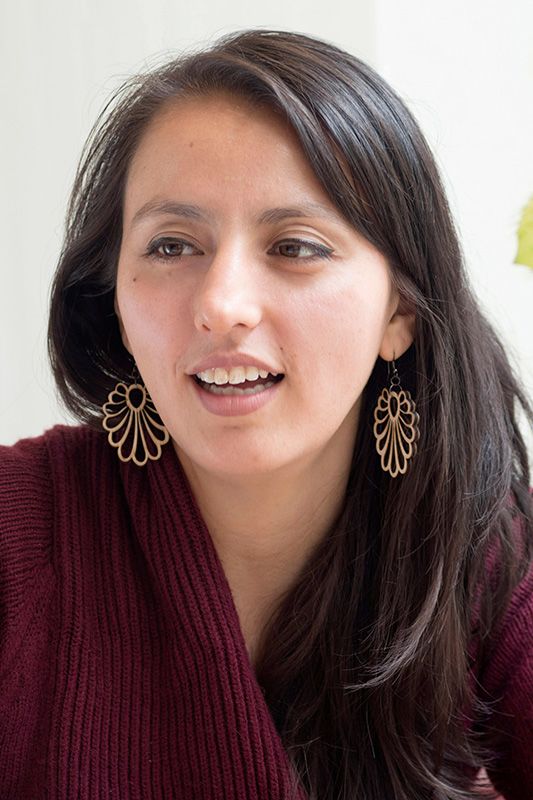 It took a year and a half to film Hafu and another year and a half to edit it. At times Nishikura agonized over whether she would be able to convey everything she wanted to say in the film. She explains more about the ideas at the heart of the 87-minute film: “Due to the popularity of hafu models and celebrities on television, there is an idealized stereotype of hafus in Japan, which is that all hafus are beautiful and bilingual. However, these people make up such a small percentage of the hafus. Even with their nightly appearance on variety shows, you never hear directly from them about their experience growing up as a hafu in Japan or their identities. Part of what we want to do with this film is to break down these stereotypes perpetuated by the media.
It took a year and a half to film Hafu and another year and a half to edit it. At times Nishikura agonized over whether she would be able to convey everything she wanted to say in the film. She explains more about the ideas at the heart of the 87-minute film: “Due to the popularity of hafu models and celebrities on television, there is an idealized stereotype of hafus in Japan, which is that all hafus are beautiful and bilingual. However, these people make up such a small percentage of the hafus. Even with their nightly appearance on variety shows, you never hear directly from them about their experience growing up as a hafu in Japan or their identities. Part of what we want to do with this film is to break down these stereotypes perpetuated by the media.
“Actually, until I went on a Peace Boat trip and learned about the Ainu, I grew up believing that Japan was a homogenous society. I began to realize this was not true while we were making the film. We would throw parties to raise production funds, and there we met not only hafus but people of many different backgrounds, including ‘returnees’ who had come back to Japan after living overseas and Korean and Chinese permanent residents. However, many of these people didn’t talk openly about their background. I really hope that this film empowers such people to not hide their backgrounds but rather take pride in their differences, and still say ‘I am part of Japan.’ I think if more and more people like this step forward, then we will truly start to see how diverse Japan really is.”
Worldwide Audience Connects with the Film
The US premiere of Hafu was held at the Japanese American National Museum in Los Angeles in April 2013, as part of the Hapa Japan event sponsored by the University of Southern California. Following that debut, the film was shown in Japan as well as in European and Asian countries.
“The issues that hafus face do differ by country,” explains Nishikura. “In the United States, there are many different races, but it seems that mixed-race individuals are often asked to choose: ‘Are you Asian or are you some other race? Are you black or are you white? Pick one.’ I don’t think many people want to choose one over the other. On the other hand, in Japan hafus often experience feeling ‘other-ed’ and are treated like they are not Japanese.
“Regardless of the country, however, people have been able to connect with the film. I think the reason is that people connect with each of the characters in their search for belonging. Even though these stories take place in Japan, that is merely the backdrop; the search for the self is a universal journey.”
The film has been greeted with enthusiasm in Japan as well among all sorts of audience members, whatever their background may be. Nishikura has made a point of including discussion events following the screening of the film for the filmmakers and hafus featured in the film to share ideas along with the audience members. These events have been so popular that many of them have sold out.
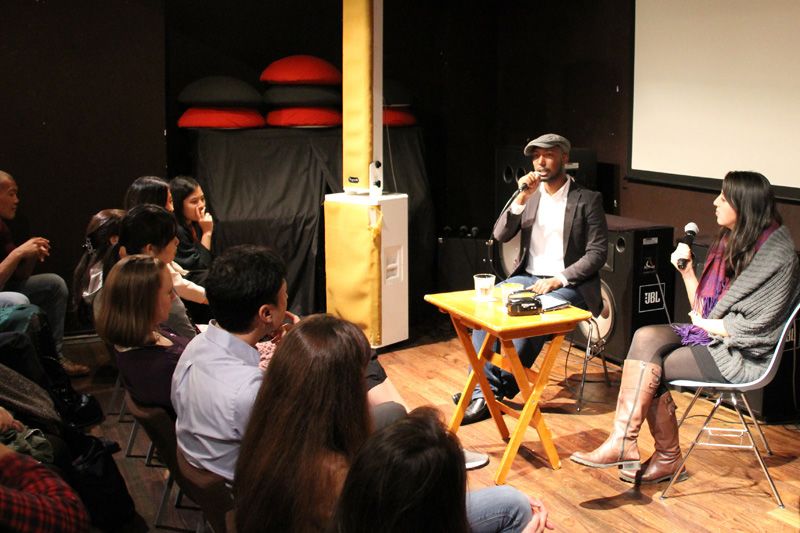 During the discussion after the October 22 screening at the Uplink movie theater in Shibuya, one teacher in attendance commented, “I’ve come into contact with all sorts of hafu students during my teaching career, and I’d really like to help kids that are suffering from bullying, like Alex in the film. I want to think more seriously about what I can do to help.” Other comments from audience members included a hafu of Japanese-German descent, who said, “Being a hafu has been no big deal to me, and watching this film makes me realize what a great environment I’ve grown up in.”
During the discussion after the October 22 screening at the Uplink movie theater in Shibuya, one teacher in attendance commented, “I’ve come into contact with all sorts of hafu students during my teaching career, and I’d really like to help kids that are suffering from bullying, like Alex in the film. I want to think more seriously about what I can do to help.” Other comments from audience members included a hafu of Japanese-German descent, who said, “Being a hafu has been no big deal to me, and watching this film makes me realize what a great environment I’ve grown up in.”
Hafus May Help Shape a New Japan
There is an array of issues that hafus may be more aware of than others, and which also can be a source of stress, such as standing out because of one’s appearance, dealing with a second language, or having to navigate problems related to nationality. Such problems might slip under the radar of those not affected personally. These are the kinds of essential issues that Nishikura wanted to call attention to through the film. She believes that in questioning their own place in society and searching for their own sense of home, hafus in Japan have the potential to be a great force for change.
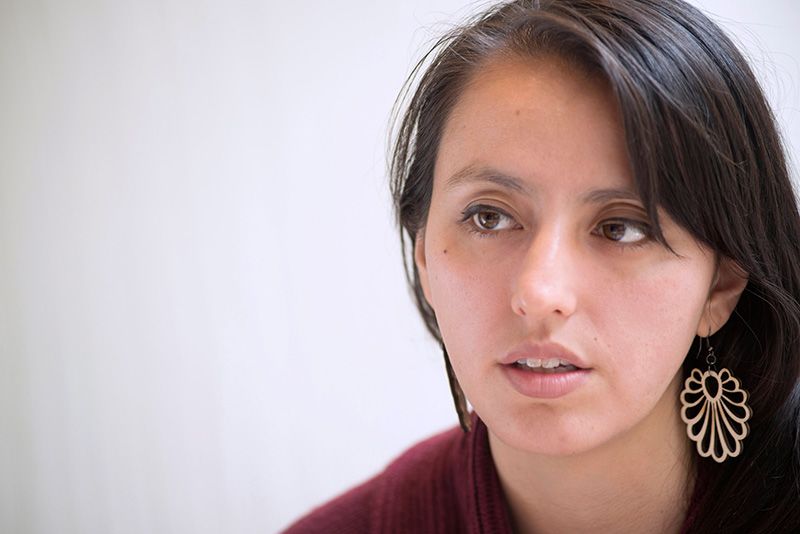 “I think Japan is just lagging behind,” Nishikura says. “Even though the number of hafus is increasing, many of them are still children. We will really start to see a difference when they become adults. It was only after I came back to Japan at 26 that I began producing this film. Even the people in the film—such as Ed, who started the Mixed Roots Kansai forum, or David, who is trying to build schools back in Ghana—are in their late 20s. I believe that in your late 20s, you have enough life and work experience to begin making a significant contribution to society. When the hafu children today are in their 20s and 30s, I think then we’ll really start to see how they’ll shape Japan.”
“I think Japan is just lagging behind,” Nishikura says. “Even though the number of hafus is increasing, many of them are still children. We will really start to see a difference when they become adults. It was only after I came back to Japan at 26 that I began producing this film. Even the people in the film—such as Ed, who started the Mixed Roots Kansai forum, or David, who is trying to build schools back in Ghana—are in their late 20s. I believe that in your late 20s, you have enough life and work experience to begin making a significant contribution to society. When the hafu children today are in their 20s and 30s, I think then we’ll really start to see how they’ll shape Japan.”
Exploring Our Human Bonds
Nishikura already has plans for her next project, but it won’t be a follow-up on the hafu theme: “Some people ask for a sequel to the film, but honestly I have already said everything I want to say about the hafu experience. Even if I were to make another film about being hafu with people of different mixes, my message wouldn’t change.
“Having made this film, I realize that I want to continue to explore the themes of identity, sense of belonging, and the underlying commonality that we as humans all share. My next project may be even bigger than the film Hafu; it concerns the meaning of ‘home.’ For example, when I went to Jordan on the Peace Boat, I visited a Palestinian refugee camp where I met young Palestinians who had never been to Palestine. Yet for some reason Palestine was their home. That is very different from my definition of home.”
Nishikura herself has called all sorts of places home. She was born in Tokyo, lived in Chiba Prefecture until the age of four, then moved to the Philippines when her father was transferred there; then she lived in China and Hawaii before attending NYU and returning to Tokyo.
“Since I moved every three years, my home constantly changed,” she says. “I used to say that the last place I lived was my home. But now, perhaps Tokyo is my home. I have lived in Japan the longest and am quite comfortable here. I have always liked big cities, so I love Tokyo. And, for example, where we are now in Shibuya, I know it like the back of my hand.”
(Article based on an October 25, 2013, interview with Nishikura Megumi in Tokyo’s Shibuya district; photographs by Kodera Kei.)
Asia Japan United States China South Korea children documentary international marriage hafu
